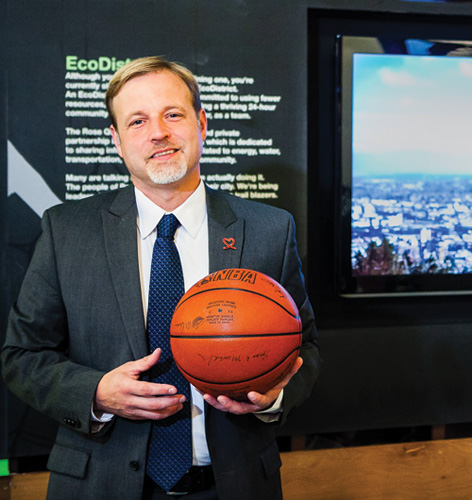 Game night, Moda Center. The arena’s approximately 16,000 light fixtures are ablaze. Water cascades from countless taps. Trash bins are filled, emptied and filled again. During each Portland Trail Blazers matchup, the energy expended on the court pales in comparison to that used up by Moda Center’s power, water and waste systems — not to mention fans’ transportation to the stadium.
Game night, Moda Center. The arena’s approximately 16,000 light fixtures are ablaze. Water cascades from countless taps. Trash bins are filled, emptied and filled again. During each Portland Trail Blazers matchup, the energy expended on the court pales in comparison to that used up by Moda Center’s power, water and waste systems — not to mention fans’ transportation to the stadium.
BY JONATHAN FROCHTZWAJG
 |
Blazers sustainability director Justin Zeulner// Photo by Jason Kaplan |
Game night, Moda Center. The arena’s approximately 16,000 light fixtures are ablaze. Water cascades from countless taps. Trash bins are filled, emptied and filled again. During each Portland Trail Blazers matchup, the energy expended on the court pales in comparison to that used up by Moda Center’s power, water and waste systems — not to mention fans’ transportation to the stadium.
The same could be said of any sports arena in America. By virtue of its size, the U.S. sports industry has a tremendous negative environmental impact, and its mass appeal is associated with excess: sprawling parking lots, jumbo-size junk food and over-the-top halftime spectacles.
But by the same token, sports can have a tremendous positive effect, harnessing not only its size but also its cultural influence to win hearts and minds in favor of low-impact living.
Just ask Justin Zeulner. As the Blazers’ sustainability director, Zeulner oversees environmental initiatives that, since 2008, have reduced the organization’s direct and indirect greenhouse gas emissions by 10,000 metric tons a year — equivalent to the average annual emissions of 7,100 Portlanders. His efforts have decreased the Blazers’ energy usage by more than 30%; increased its landfill diversion by some 55%; trimmed its nonlocal, nonorganic food purchasing to just 10%; and earned Moda Center (then the Rose Garden) LEED Gold status, making the arena the first major-league sports facility to attain the prestigious U.S. Green Building Council designation.
Along the way, Zeulner has made the Trail Blazers, well, trailblazers in the growing green-sports movement — and even made the midmarket sports team an out-of-left-field leader among Fortune 500 giants in the broader private-sector movement for climate-change action.
“What one team in a medium-size market has been able to do to inspire this industry and to shape society — that’s where the Trail Blazers’ journey gets magnificent,” Zeulner says.
Raised on a small farm in Beaverton where his family grew vegetables and raised chickens, Zeulner comes across as an earnest and impassioned advocate for the cause. “I was always very grounded with the earth,” he observes. After graduating from the University of Oregon with an M.B.A., he worked as the human-resources director at Klamath County’s Willamette Pass Resort, where he saw the ravages of global warming up close and personal, from shorter seasons to spotty snowfall.
“The canary in the coal mine right now is our ski areas, and my heart is still on that mountain.”
Zeulner brought his eco-consciousness to the Blazers when he was hired as the team’s transportation and planning director in 1999; he became director of sustainability in 2008. Today, sitting in his lamp-lit Rose Quarter office — “I like to keep the energy low” — the neatly groomed 41-year-old offers case study after case study of green innovation. When the Blazers couldn’t find a local facility to process compostables, the organization leveraged the 600 tons of food waste it produces each year to get Portland waste-management company Republic Services to open one. And when the team couldn’t find recycling stations meeting the arena’s specific needs, it had a local outfit custom design 100% recycled and recyclable ones.
Ideas such as these have attained a reach beyond Portland through the Green Sports Alliance, an industry group of pro-sports organizations seeking to green their operations. Co-founded by Paul Allen’s Vulcan Inc. in 2011 with just a handful of Northwest teams — including the Blazers — as members, the Alliance has rapidly expanded into a 170-team information-sharing network.
“We now have a funnel we can go through to share best practices,” says Zeulner, who sits on the group’s board. A case in point is the custom-designed recycling stations, now in use at the University of Washington’s Husky Stadium and Los Angeles’ Staples Center.
Though Zeulner’s own environmentalism is deeply personal, the self-described “capitalist and environmentalist” is a zealous exponent of the notion that green initiatives simply make good business sense, lowering companies’ energy costs and burnishing their brands. Though the Blazers have spent about $650,000 on sustainability projects, the organization has saved more than $3 million in energy, water and waste costs.
“We need to do the right thing, because climate change is real and we own a part of that,” he says. “But there is a business case for environmental stewardship which cannot be ignored.”
Zeulner has a knack for making connections between environmentalism and economics, but he is not alone in recognizing those links. As the Blazers’ liaison to Businesses for Innovative Climate & Energy Policy (BICEP), a coalition lobbying for federal legislation on climate change, he is in such big-league company as Nike and Starbucks. Zeulner says a petition BICEP helped start and that more than 600 businesses signed, the Climate Declaration, influenced the Climate Action Plan President Obama laid out in a speech last summer.
“[Obama] said the private sector is with us on this; you can no longer say this is bad for business,” he recalls. “What our president and our BICEP members are talking about is it’s OK to be an environmentalist and a capitalist — in fact, there’s a great marriage there.”
Indeed, there turns out to be a powerful if counterintuitive relationship between environmentalism and professional sports. The industry has long used its cachet to pitch products (think Wheaties). Now sports teams are bestowing that unifying imprimatur on divisive yet pressing social issues such as global warming.
“Sports has an amazing ability to move people,” Zeulner says, citing Jackie Robinson’s effect on U.S. race relations. “It doesn’t matter what ethnicity you are, or what religion, or if you vote right or left; when you’re together with other, like-minded individuals celebrating the success of something bigger than you, you start to lose all that disconnects you, and you can move that needle.”
For Zeulner, that power translates into responsibility. “There are organizations inside and outside the sports industry that don’t stick their necks out,” he says. “Through our iconic brands and the players associated with us, we can motivate people to behave differently. The question is: What are we doing about it?”


